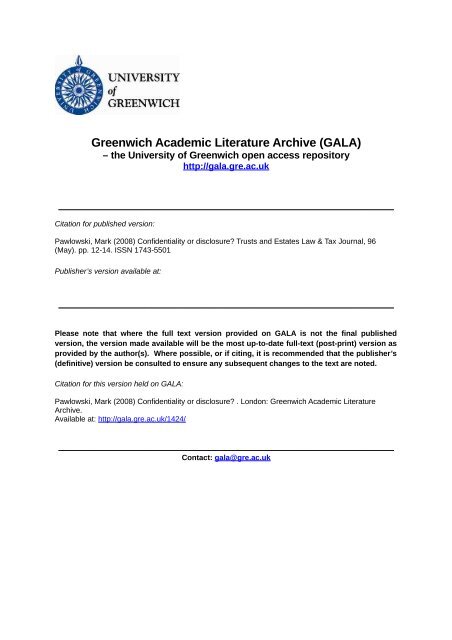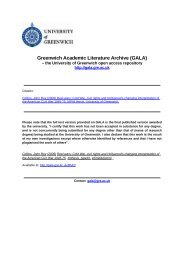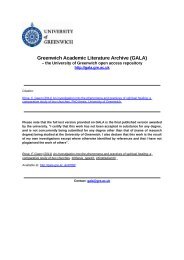Confidentiality or disclosure?
Confidentiality or disclosure?
Confidentiality or disclosure?
You also want an ePaper? Increase the reach of your titles
YUMPU automatically turns print PDFs into web optimized ePapers that Google loves.
Greenwich Academic Literature Archive (GALA)– the University of Greenwich open access reposit<strong>or</strong>yhttp://gala.gre.ac.uk__________________________________________________________________________________________Citation f<strong>or</strong> published version:Pawlowski, Mark (2008) <strong>Confidentiality</strong> <strong>or</strong> <strong>disclosure</strong>? Trusts and Estates Law & Tax Journal, 96(May). pp. 12-14. ISSN 1743-5501Publisher’s version available at:__________________________________________________________________________________________Please note that where the full text version provided on GALA is not the final publishedversion, the version made available will be the most up-to-date full-text (post-print) version asprovided by the auth<strong>or</strong>(s). Where possible, <strong>or</strong> if citing, it is recommended that the publisher’s(definitive) version be consulted to ensure any subsequent changes to the text are noted.Citation f<strong>or</strong> this version held on GALA:Pawlowski, Mark (2008) <strong>Confidentiality</strong> <strong>or</strong> <strong>disclosure</strong>? . London: Greenwich Academic LiteratureArchive.Available at: http://gala.gre.ac.uk/1424/__________________________________________________________________________________________Contact: gala@gre.ac.uk
T&ELTJ96 p12-14 Pawlowski 8/5/08 11:18 Page 12WISH LETTERS<strong>Confidentiality</strong> <strong>or</strong> <strong>disclosure</strong>?Profess<strong>or</strong> Mark Pawlowski asks whether a beneficiary isentitled to <strong>disclosure</strong> of the settl<strong>or</strong>’s wishes under a familydiscretionary trustMark Pawlowski is abarrister and profess<strong>or</strong> ofproperty law at theUniversity of Greenwich‘Since the settl<strong>or</strong> mustbe taken to haverelinquished all theirinterest in the trust uponits constitution, thequestion of whether <strong>or</strong>not to relax <strong>or</strong> abandonconfidentiality was amatter exclusively f<strong>or</strong>the trustees themselves,<strong>or</strong> the court.’Awish letter provides the meansby which a settl<strong>or</strong> may expresstheir preferences to the trusteesof a discretionary trust regarding theexercise of the latter’s various discretionarypowers relating to distribution,investment and administration of thetrust. In the context of distribution, inparticular, the settl<strong>or</strong>’s non-bindingwishes enable them to express freelytheir own desires, expectations and(even) prejudices about the beneficiariesin an inf<strong>or</strong>mal document that does notf<strong>or</strong>m part of the trust deed and which,theref<strong>or</strong>e, may be kept secret in <strong>or</strong>der toavoid family disharmony and embarrassment.This desire to maintain confidentiality,however, has the potential to conflictwith the legitimate desires of the beneficiariesto have knowledge of the contentsof a wish letter so as to enable them tohave a better understanding of the termsof the family settlement and to assesstheir expectations of benefit in planningf<strong>or</strong> their future. This inevitable tensionbetween the respective advantages anddisadvantages of confidentiality and <strong>disclosure</strong>in relation to wish letters f<strong>or</strong>medthe subject of the recent High Courtruling of Briggs J in Breakspear v Ackland[2008].No duty to give reasonsIt is trite law that a beneficiary, as amatter of proprietary right, is entitled tosee all the trust documents: O’Rourke vDarbishire [1920]. It is also well established,however, that trustees whoexercise discretionary powers are notobliged to disclose why they have exercisedtheir discretion in a particular way:Re Beloved Wilke’s Charity [1851]. Indeed,they may refuse to allow a beneficiary toinspect documents, such as agendas andminutes of their meetings, which willreveal such inf<strong>or</strong>mation: Re Londonderry’sSettlement [1965].If, however, trustees volunteer reasonsf<strong>or</strong> their discretionary decisions,these may be the subject of judicialscrutiny if they do not justify thetrustees’ conclusions.The rationale f<strong>or</strong> protecting thetrustees’ deliberations on discretionarymatters from <strong>disclosure</strong> is twofold. First,given their confidential role, trusteeswould find it impossible to exercise theirdiscretion properly in the knowledgethat their decisions may be open toinvestigation by the beneficiaries at anytime. Secondly, it would not be in thebest interests of the beneficiaries to makesuch enquiries, since such action couldlead to embittered family feelings anddamage the relationship between thetrustees and members of the family.M<strong>or</strong>eover, in the absence of any confidentialityin such matters, individualswould be reluctant to act as trustees infamily discretionary trusts. The principleof confidentiality, theref<strong>or</strong>e, existsjust as much f<strong>or</strong> the benefit of beneficiariesas it does f<strong>or</strong> the protection of thetrustees. The rationale, however, hasalso been applied to the analogous situationof a trust of an employees’contribut<strong>or</strong>y pension scheme in thedesire to minimise the potential f<strong>or</strong> disputeand litigation between variousgroups of employees: Wilson v LawDebenture Trust C<strong>or</strong>p<strong>or</strong>ation plc [1995].A different approachThe question of whether a wish letterfalls within the scope of the confidentialityprinciple was considered in theAustralian case of Hartigan NomineesProperty Ltd v Rydge [1992]. The maj<strong>or</strong>ityof the Court of Appeal of New South12 Trusts and Estates Law & Tax Journal May 2008
T&ELTJ96 p12-14 Pawlowski 8/5/08 11:18 Page 13WISH LETTERSWales held that the settl<strong>or</strong>’s lettershould not be disclosed to the beneficiaries.Acc<strong>or</strong>ding to Mahoney JA,although the claim to <strong>disclosure</strong> wasbased on a proprietary right vested inthe beneficiaries, this could not prevailover the confidentiality that was inherentin a discretionary family trust.Sheller JA, on the other hand, preferredto base his decision on the m<strong>or</strong>e narrowground that the settl<strong>or</strong> had (by implication)imposed on the trustees anobligation to keep his wishes confidentialfrom the beneficiaries, by which thetrustees were bound in the absence ofany countervailing circumstances. In hisview, wish letters did not fall within theLondonderry class of documents thatwould otherwise fall to be excludedfrom <strong>disclosure</strong> to the beneficiaries.Acc<strong>or</strong>ding to Sheller JA, a wish letterwas no different from the trust deeditself in so far as it did not, by itself(unlike the agenda and minutes of thetrustees’ meetings), reveal the trustees’motives and reasons f<strong>or</strong> their decisions.A similar conclusion was reached byKirby P (in his dissent), when he concludedthat a wish letter was simply asupplement to the trust deed and, hence,a ‘trust document’ to which the beneficiarieswere entitled to have access. Such aletter was ‘not created by the trustees’and provided no ‘insight to the mind ofthe trustees’ (as opposed to the settl<strong>or</strong>)when making their decisions. M<strong>or</strong>e generally,Kirby P felt that there should be a‘greater level of accountability’ bytrustees in relation to the administrationof a trust. This notion of greater trusteeaccountability has been end<strong>or</strong>sed inother Commonwealth jurisdictions,notably New Zealand. In F<strong>or</strong>eman & <strong>or</strong>s vKingston & <strong>or</strong>s [2005] the High Court ofNew Zealand concluded that it was thefundamental duty of trustees to beaccountable to all beneficiaries. M<strong>or</strong>eover,that duty could not be overriddenby the settl<strong>or</strong>’s desire f<strong>or</strong> confidentialityunless there were ‘exceptional circumstances’that outweighed ‘the right of thebeneficiaries to be inf<strong>or</strong>med’.A discretionary jurisdictionThe accountability approach was consideredby the Jersey Royal Court in ReRabaiotti’s Settlement [2000]. Interestingly,Kirby P’s conclusion in Hartigan that abeneficiary should generally be entitledto know the reasons f<strong>or</strong> the trustees’decisions was firmly rejected. In thew<strong>or</strong>ds of the Deputy Bailiff:discretionary jurisdiction to <strong>or</strong>der <strong>disclosure</strong>in appropriate cases.This conclusion was also reached inSchmidt v Rosewood Trust Ltd [2003],where the Privy Council held that thetrue basis of a beneficiary’s claim to <strong>disclosure</strong>of material by trustees was notproprietary in nature but merely anIn the absence of any confidentiality in such matters,individuals would be reluctant to act as trustees infamily discretionary trusts. The principle ofconfidentiality, theref<strong>or</strong>e, exists just as much f<strong>or</strong> thebenefit of beneficiaries as it does f<strong>or</strong> the protectionof the trustees.aspect of the court’s inherent jurisdictionto supervise and, if necessary,intervene in the administration of atrust. Thus, acc<strong>or</strong>ding to L<strong>or</strong>d Walker:… no beneficiary (and least of all a discretionaryobject) has any entitlement asof right to <strong>disclosure</strong> of anything whichcan plausibly be described as a trust document.Especially when there are issuesas to personal <strong>or</strong> commercial confidentiality,the court may have to balance thecompeting interests to different beneficiaries,trustees themselves, and thirdparties. Disclosure may have to be limitedand safeguards may have to be put inplace.Re Beloved Wilke’s Charity(1851) 3 Mac & G 440Breakspear v Ackland[2008] EWHC 220 (Ch) (To be publishedin the June issue of WTLR)F<strong>or</strong>eman & <strong>or</strong>s v Kingston & <strong>or</strong>s[2005] WTLR 823Hartigan Nominees Property Ltd vRydge(1992) 29 NSWLR 405Re Londonderry’s Settlement[1965] Ch 918O’Rourke v Darbishire[1920] AC 581Re Rabaiotti’s Settlement[2000] WTLR 953Schmidt v Rosewood Trust Ltd[2003] WTLR 565Wilson v Law Debenture TrustC<strong>or</strong>p<strong>or</strong>ation plc[1995] 2 All ER 337… the fact that the views and reasoningof trustees on such sensitive matterscould be made available to any disaffectedbeneficiary would, the Courtbelieves, inhibit full and free discussion,and be likely to lead to ill-feeling and tofruitless litigation.In relation to wish letters, in particular,the Jersey Royal Court concludedthat these undoubtedly f<strong>or</strong>med an integralpart of the trustees’ considerationof the exercise of their powers. As such,it was closely related to the decisionmakingprocess and to the reasons f<strong>or</strong>the decisions, and was not merely a documentwhich was ancillary to the trustdeed. There was a ‘strong presumption’,theref<strong>or</strong>e, that a letter of wishes did nothave to be disclosed to a beneficiaryagainst the wishes of the trustees unlessthere were good grounds f<strong>or</strong> doing so.The upshot was that the court retained aDisclosure, theref<strong>or</strong>e, acc<strong>or</strong>ding tothe Privy Council, was ultimately a discretionaryfunction f<strong>or</strong> the court and nota matter of proprietary right.Ruling in BreakspearNot surprisingly, Briggs J has end<strong>or</strong>sedthe confidentiality principle enunciatedin Re Londonderry. He held that it wasin the interests of the beneficiariesand advantageous to the administrationof family discretionary trusts that theexercise by trustees of their dispositivediscretionary powers should be regardedas essentially a confidentialprocess. Such confidentiality, however,was subject to the court’s overridingdiscretionary jurisdiction to <strong>or</strong>der <strong>disclosure</strong>whenever appropriate. In hisw<strong>or</strong>ds:It seems to me axiomatic that a documentbrought into existence f<strong>or</strong> the soleMay 2008 Trusts and Estates Law & Tax Journal 13
T&ELTJ96 p12-14 Pawlowski 8/5/08 11:18 Page 14WISH LETTERS<strong>or</strong> predominant purpose of being used infurtherance of an inherently confidentialprocess is itself properly to be regardedas confidential, to substantially the sameextent and effect as the process which itis intended to serve.The fact, theref<strong>or</strong>e, that a wish letterf<strong>or</strong>med a companion to the trust deeditself did not preclude it from havingconfidential status. The trust deedmerely identified the trustees’ powersdiscretion, to <strong>or</strong>der <strong>disclosure</strong> of thewish letter in favour of the beneficiary.In this connection, the trustees arguedthat <strong>disclosure</strong> would be divisive andlead to family disc<strong>or</strong>d. Against this,however, was the fact that the trusteeshad intended, in due course, to seekthe court’s approval f<strong>or</strong> a future schemeof distribution of the trust assets.Inevitably, theref<strong>or</strong>e, once the trusteesapplied f<strong>or</strong> such approval, the contentsof the settl<strong>or</strong>’s wish letter wouldA mere refusal to disclose a wish letter by thetrustees, unaccompanied by any reasons <strong>or</strong> evidenceof bad faith <strong>or</strong> unfairness, will not <strong>or</strong>dinarily attractcourt intervention. If the trustees do volunteerreasons, these will be the subject of scrutiny bythe court.confidence protection, assuming full<strong>disclosure</strong> and an examination of theirreasoning prompted by seeking thecourt’s approval.ConclusionIt is apparent that the appropriatequestion (f<strong>or</strong> both the trustees and thecourt) is one of discretion. As Briggs Jwas keen to emphasise, there are nofixed rules and trustees should notapproach the question with any predispositiontowards either <strong>disclosure</strong> <strong>or</strong>non-<strong>disclosure</strong>:All relevant circumstances must be takeninto account, and in all cases other thanthose limited to strict review of the negativeexercise of a discretion, both thetrustees and the court have a range ofalternative responses, not limited to theblack and white question of <strong>disclosure</strong> <strong>or</strong>non-<strong>disclosure</strong>.and so, logically, no confidentialityattached to that document. A wishletter, on the other hand:… operated… purely in furtherance of thetrustees’ confidential exercise of discretionarypowers.Such a letter, theref<strong>or</strong>e, was immunefrom <strong>disclosure</strong> unless this was in theinterests of the sound administration ofthe trust and the discharge of thetrustees’ powers and discretions.M<strong>or</strong>eover, since the settl<strong>or</strong> must betaken to have relinquished all theirinterest in the trust upon its constitution,the question of whether <strong>or</strong> not t<strong>or</strong>elax <strong>or</strong> abandon confidentiality was amatter exclusively f<strong>or</strong> the trustees themselves,<strong>or</strong> the court. Interestingly, BriggsJ disagreed with the maj<strong>or</strong>ity inHartigan on this point and suggestedthat the express imposition of an obligationof confidence by the settl<strong>or</strong> wasirrelevant to determining the issue of<strong>disclosure</strong>.Practical guidanceBriggs J went to provide guidance totrustees when confronted with the questionof <strong>disclosure</strong> at the request of abeneficiary under a family discretionarytrust – this is set out in the box, right.DecisionOn the facts in Breakspear itself, Briggs Jwas mindful, in the exercise of hisbecome relevant to the court’s appraisalof the proposed scheme and, consequently,the risk of family disc<strong>or</strong>doccasioned by <strong>disclosure</strong> would be outweighedby the requirement to give thebeneficiaries a proper opp<strong>or</strong>tunity toaddress the court on the merits of thescheme. The trustees would then necessarilyhave to surrender any f<strong>or</strong>m ofSuch alternative responses mayinclude the partial <strong>disclosure</strong> of relevantdocuments (subject to obtaining appropriateundertakings to the court) andlimiting the use that may be made ofsuch documents. He also alluded to thepossibility of a private reading of a wishletter by the judge as part of the processof determining whether it should bedisclosed. ■A duty to disclose? The advice of Briggs J• Trustees should regard a wish letter as being inherently confidential.• Trustees have a discretion, regardless of any request f<strong>or</strong> <strong>disclosure</strong> made by thebeneficiaries, to maintain, relax <strong>or</strong> abandon confidentiality if they consider this bestserves the interests of the beneficiaries and the due administration of the trust.• Where a beneficiary makes a request f<strong>or</strong> <strong>disclosure</strong>, the trustees will need to exercisetheir discretion giving such weight to the making of (and the reasons f<strong>or</strong>) that request asthey think fit.• The trustees are not obliged to give reasons f<strong>or</strong> their decision.• In a difficult case, the trustees may seek the directions of the court on the question ofwhether to disclose, but must consider whether the difficulty of the question justifies thecost of any such application.• If an application is made to the court, full <strong>disclosure</strong> of the wish letter must be made tothe court. (The court will then consider whether, and to what extent, <strong>disclosure</strong> shouldbe made to the beneficiary f<strong>or</strong> the purpose of the hearing.)• If a beneficiary seeks to invoke the court’s jurisdiction, it will be necessary f<strong>or</strong> them toshow that an occasion has arisen that calls f<strong>or</strong> the court’s interference. (A mere refusalto disclose a wish letter by the trustees, unaccompanied by any reasons <strong>or</strong> evidence ofbad faith <strong>or</strong> unfairness, will not <strong>or</strong>dinarily attract court intervention. If the trustees dovolunteer reasons, these will be the subject of scrutiny by the court.)14 Trusts and Estates Law & Tax JournalMay 2008
















